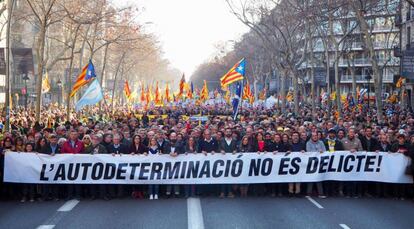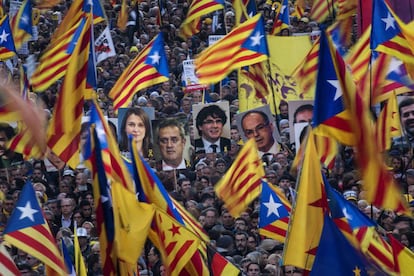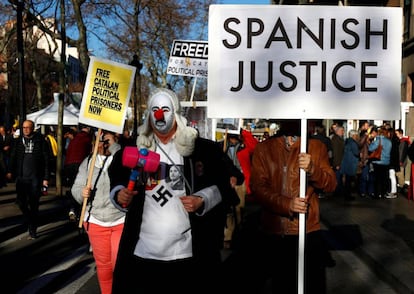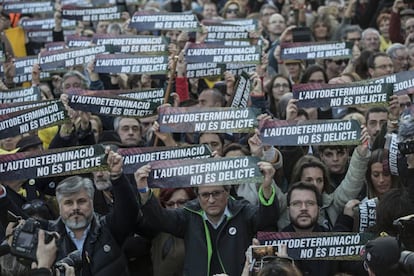Thousands protest in Barcelona against trial of Catalan separatist leaders
Around 200,000 people participated in the demonstration, making it one of biggest since last year’s Catalonia Day march

Hundreds of thousands of people took to the streets of Barcelona on Saturday to protest against the Supreme Court trial of 12 separatist leaders who are facing charges for their involvement in the illegal independence referendum on October 1, 2017, and the unilateral declaration of independence that was passed in parliament a few weeks later.
According to the Civil Guard, around 200,000 protesters took part in the demonstration in the Catalan capital, but organizers put the figure as high as 500,000.
The protest, which rallied under the slogan “self-determination is not a crime,” was headed by Catalan premier Quim Torra, regional ministers, leaders from pro-independence parties and the Catalan branch of anti-austerity party Podemos, Catalunya en Comú (Catalonia in Common).

According to estimates from the Civil Guard, it was the biggest pro-independence demonstration since last year’s Diada, or Catalan National Day, on September 11. A protest held on the anniversary of the illegal referendum attracted 180,000 people, while 40,000 people attended the pro-independence demonstration against the central government’s Cabinet meeting in Barcelona on December 2.
The protest, which was supported by all pro-independence parties, marks the beginning of a series of planned actions against the Supreme Court trial. On Thursday, a general strike has been called by a minority union and another protest is planned in Madrid on March 16.
The demonstration on Saturday moved through the central Gran Vía thoroughfare, and was meant to cover the two-kilometer distance between Universidad square, where a stage had been set for speeches, and Plaza de España. But there were so many attendees that by the time the front of the march began to march, a sea of people had already reached the stage in Universidad square.
Protesters waved Estelada flags, the symbol of Catalan independence, sung the lyrics to L’estaca, a popular song by Catalan artist Lluis Llach, and carried signs with the faces of the independence leaders on trial. Other signs expressed support for self-determination or shared messages such as: “Now they judge everyone,” and: “From Felipe V to Felipe VI, the repression continues,” in reference to one of Spain’s former kings and the current monarch. Some protesters criticized the Spanish justice system by wearing judges’ robes and clown noses.

As well as the Catalan premier, the parliament speaker Roger Torrent, regional ministers, leaders of pro-independence parties Catalan Republican Left (ERC), Junts per Catalunya (Together for Catalonia) and European Democratic Party of Catalonia (PdeCat), as well as Catalunya en Comú, the party of Barcelona Mayor Ada Colau, also took part in the protest. Jèssica Albiach, a deputy from Colau’s party, said she believed the separatists had not committed any crime: “This is not about independence, it’s about democracy.”
Torra, meanwhile, called on the Spanish government of Socialist Party (PSOE) Prime Minister Pedro Sánchez to listen to the protesters: “Spain cannot be governed without listening to Catalonia.” Torra called on the international community to mediate the conflict and promised to keep up the international campaign despite the fact the European parliament banned him and ousted former premier Carles Puigdemont from giving a conference at their headquarters. “We will go to the biggest chamber in Brussels. Don’t they realize this?” said Torra.

Supporters of the Catalan independence leaders have sought to cast doubt on the impartiality of the Spanish justice system, claiming the Supreme Court hearing, which began last Tuesday in Madrid, will not offer the defendants a fair trial. During the first days of the case, the former deputy premier of Catalonia, Oriol Junqueras, refused to answer prosecutors’ questions, casting himself as “a political prisoner.”
The trial comes at a moment of increased political uncertainty in Spain. Last Friday, Prime Minister Sánchez called a snap general election for April 28 after his 2019 budget plans were rejected by Congress. Sánchez, who leads a minority government, needed the support of pro-Catalan independence groups to pass the budget but these parties voted against him after negotiations with the government broke down.
While the separatist parties presented a unified front at Saturday’s march, cracks have begun to appear in the lead up to the snap election. ERC has refused to join forces with Junts per Catalunya at the election and not all party leaders have backed the general strike.
English version by Melissa Kitson.
Tu suscripción se está usando en otro dispositivo
¿Quieres añadir otro usuario a tu suscripción?
Si continúas leyendo en este dispositivo, no se podrá leer en el otro.
FlechaTu suscripción se está usando en otro dispositivo y solo puedes acceder a EL PAÍS desde un dispositivo a la vez.
Si quieres compartir tu cuenta, cambia tu suscripción a la modalidad Premium, así podrás añadir otro usuario. Cada uno accederá con su propia cuenta de email, lo que os permitirá personalizar vuestra experiencia en EL PAÍS.
¿Tienes una suscripción de empresa? Accede aquí para contratar más cuentas.
En el caso de no saber quién está usando tu cuenta, te recomendamos cambiar tu contraseña aquí.
Si decides continuar compartiendo tu cuenta, este mensaje se mostrará en tu dispositivo y en el de la otra persona que está usando tu cuenta de forma indefinida, afectando a tu experiencia de lectura. Puedes consultar aquí los términos y condiciones de la suscripción digital.









































